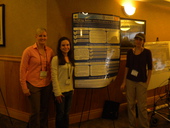Highlight
SCALE-IT women create outreach activities for the TN Grace Hopper Women in Computing Conference
Achievement/Results
Sally Ellingson, a trainee with a mathematics and computer science background who is now pursuing a PhD in Life Sciences, attended the National Grace Hopper Women in Computing (GH WiC) Conference in 2010 with SCALE-IT support. Her positive experience left her determined to contribute to the 2011 TN regional GH WiC conference. She rallied many of the women of the SCALE-IT program (Rachel Adams, Denise Koessler, Beth Johnson, and Caroline Rempe) to create a number of programming elements for the conference. Their goals were to bring to the conference a sense of the challenges of interdisciplinary computational biology research, to highlight the importance and need to integrate high-performance computing into biological research, and to share with participants how the SCALE-IT program is addressing the challenges of training graduate students to meet these needs. The group created a number of activities to engage the conference participants, which included research and academic professionals as well as graduate, undergraduate, and high school students. They sponsored a roundtable discussion about challenges and advantages of interdisciplinary research, Sally led a session about balancing family and a research career, and Denise presented a poster about the SCALE-IT curriculum designed to provide early stage cross-disciplinary training to graduate students. Denise won the award for best poster presentation and a travel scholarship to the National GH WiC Conference. Caroline (along with another UT student Reka Kelemen) created several social activities to reinforce their message. One group of conference participants played a game of “Interdisciplinary Clue” whereby players had to deduce the members of the team required to solve a complex research problem. In another session, participants engaged in a choreographed folk dance that walks the dancers through the inner architecture of a computer.
Address Goals
The initiative shown by these IGERT women contributes to the growing diversification of the computer science workforce, still largely dominated by men. By getting involved and engaged with high school and undergraduate women to provide examples of how to build a career in computer science, to mentor them about challenges, and to be role models for others, they are empowering more women to choose the same path.








